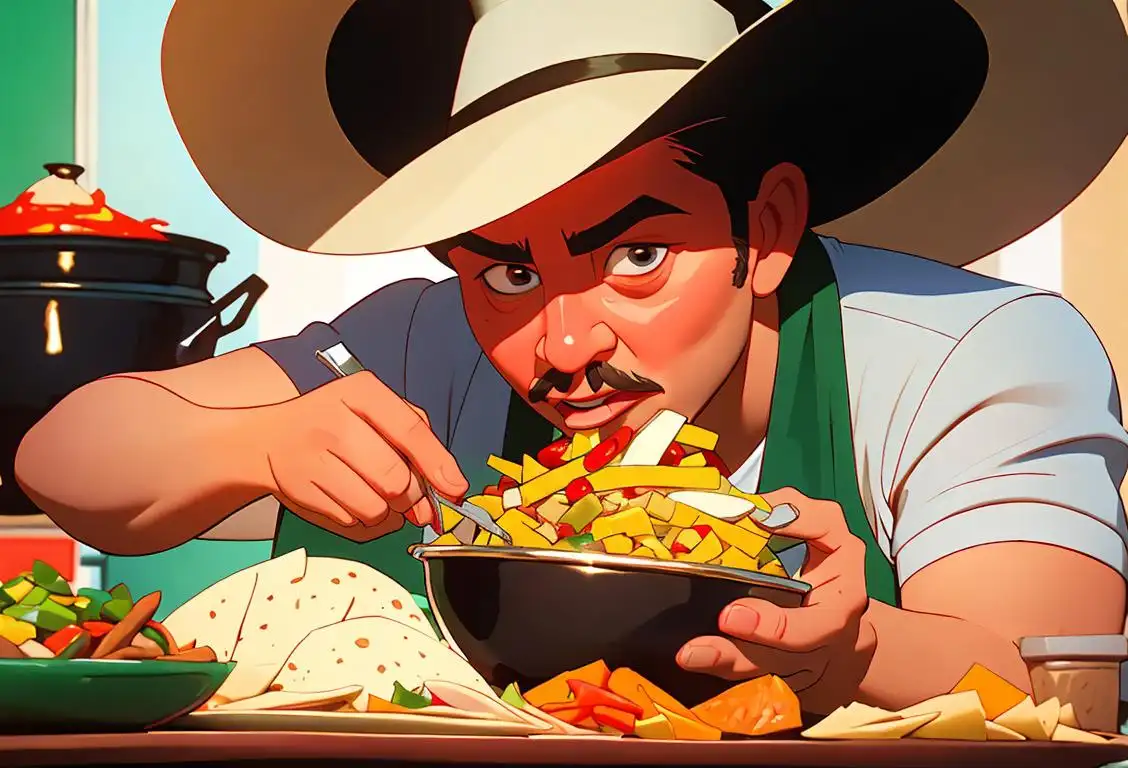National Mexican Gastronomy Day

Hey there amigos! Are you ready to spice up your day? Well, get your taste buds tingling, because it's National Mexican Gastronomy Day! Grab your sombrero, put on some mariachi music, and let's dive into the flavorful world of Mexican cuisine.
When is Mexican Gastronomy Day?
It's national mexican gastronomy day on the 17th November.
The Sizzling History of National Mexican Gastronomy Day
Buckle up, because we're about to take a culinary journey south of the border! National Mexican Gastronomy Day celebrates the rich and diverse flavors of one of the most beloved cuisines in the world. From the spicy street tacos to the hearty enchiladas, Mexican food has captured the hearts (and stomachs) of foodies around the globe.
But how did this delicious day come to be? Well, let me dish out the internet history for you. Although the origins of National Mexican Gastronomy Day remain a bit mysterious, one thing is certain: it began to gain online popularity on November 17, 2017. On that day, Mexican food enthusiasts took to the internet to share their love for all things savory, spicy, and oh-so-delicious!
Now, this celebration isn't just about devouring mouthwatering dishes. It's also an opportunity for food lovers to appreciate the rich culture and traditions behind Mexican gastronomy. From the ancient Mayan and Aztec civilizations to the modern-day fusion of flavors, Mexican cuisine tells a story of incredible artistry, creativity, and love for food.
Tantalizing Tacos and Delectable Dishes
What makes Mexican food so special? Well, amigos, it's all in the ingredients and the vibrant culinary techniques. From the fiery chilies to the aromatic spices, every bite carries a burst of flavor that will transport you to the streets of Mexico.
One dish that embodies the essence of Mexican cuisine is the beloved taco. Whether it's a soft corn tortilla or a crispy shell, tacos are a true fiesta for your taste buds. Top them with juicy marinated meats, fresh cilantro, tangy salsa, and a squeeze of lime, and you've got a symphony of flavors dancing in your mouth.
And let's not forget about other Mexican favorites like enchiladas, tamales, and guacamole. These dishes are like a party on a plate, bursting with colors and bursting with flavors.
Fiesta, Familia, and Food
When it comes to Mexican gastronomy, it's not just about the food itself. It's also about the shared experiences and the warm sense of community that accompanies every meal. In Mexico, food is a language of love, and a way to connect with loved ones.
So, on this special day, let's gather around the table with our friends and family. Let's savor the flavors, share stories, and create cherished memories. And if you can't physically be with your loved ones, why not organize a virtual taco party? Trust me, it's a delicious way to stay connected.
History behind the term 'Mexican Gastronomy'
1521
Spanish Conquest of Mexico
Mexican gastronomy has its roots in the Spanish conquest of Mexico in 1521. When the Spanish arrived, they brought with them a variety of ingredients and culinary techniques that significantly influenced the local cuisine.
1521
The Spanish Conquest
Mexican gastronomy owes its origins to the Spanish conquest of Mexico in 1521. When the Spanish colonizers arrived, they brought with them their own culinary traditions, ingredients, and cooking techniques. The encounter between the indigenous Mexican cuisine and the Spanish cuisine gave birth to what is now known as Mexican gastronomy. This blending of cultures and ingredients laid the foundation for the rich and diverse culinary heritage of Mexico.
1810-1821
Mexican War of Independence
The Mexican War of Independence, which took place from 1810 to 1821, marked a crucial period in the history of Mexican gastronomy. During this time, Mexico's struggle for independence from Spain led to a resurgence of national pride and cultural identity. Mexican cuisine played a significant role in fostering a sense of unity among the Mexican people and became intricately linked to the nation's history and heritage.
16th century
Culinary Fusion
The fusion of Spanish and indigenous Mexican cuisines began in the 16th century. Traditional Mexican ingredients such as corn, beans, chilies, and chocolate were combined with Spanish ingredients like pork, chicken, rice, and wheat. This fusion resulted in the creation of iconic dishes such as tamales, enchiladas, and mole.
1910-1940
Mexican Revolution
The Mexican Revolution, spanning from 1910 to 1940, brought about significant changes in Mexican society, including its gastronomy. The revolution spurred a movement to reclaim and celebrate indigenous Mexican culture, which had a profound influence on the evolution of Mexican cuisine. Traditional ingredients, cooking methods, and regional dishes gained prominence as symbols of national identity, and efforts were made to preserve and revive ancient culinary traditions.
19th century
Influence of French Cuisine
During the 19th century, Mexican gastronomy also experienced the influence of French cuisine due to the French occupation of Mexico. French culinary techniques, ingredients, and recipes were integrated into Mexican cooking, adding a touch of sophistication and refinement.
2010
UNESCO Intangible Cultural Heritage of Humanity
In 2010, Mexican gastronomy was recognized as an Intangible Cultural Heritage of Humanity by UNESCO. This prestigious designation acknowledges the unique value and importance of Mexican cuisine in shaping the cultural landscape of Mexico and its global significance. It highlights the centuries-old culinary traditions, diverse regional variations, and the use of indigenous ingredients that make Mexican gastronomy a treasure of world heritage. The recognition has helped to raise awareness about the cultural significance of Mexican cuisine and promote its preservation and appreciation worldwide.
20th century
National Embrace
In the 20th century, Mexican gastronomy began to be celebrated and embraced as a cornerstone of national identity. The recognition of traditional Mexican dishes and the acknowledgment of the country's culinary diversity led to the establishment of numerous gastronomic organizations and culinary schools.
2010
UNESCO Intangible Cultural Heritage
In 2010, Mexican gastronomy was officially recognized by UNESCO as an Intangible Cultural Heritage of Humanity. This designation highlighted the importance of Mexican cuisine as a cultural symbol and its significant contribution to the world's culinary heritage.
Did you know?
Did you know that Mexican cuisine is recognized as an Intangible Cultural Heritage of Humanity by UNESCO? That's right, folks! The world has officially taken note of the mouthwatering awesomeness that is Mexican gastronomy.Tagged
food fun loved ones propertyFirst identified
16th November 2016Most mentioned on
17th November 2017Total mentions
116Other days
Believe Day
Caregivers Day
Opposite Day
One Day
Awareness Day
Family Day
Happiness Day
Suicide Prevention Month Day
Action Day
Cancer Awareness Day









